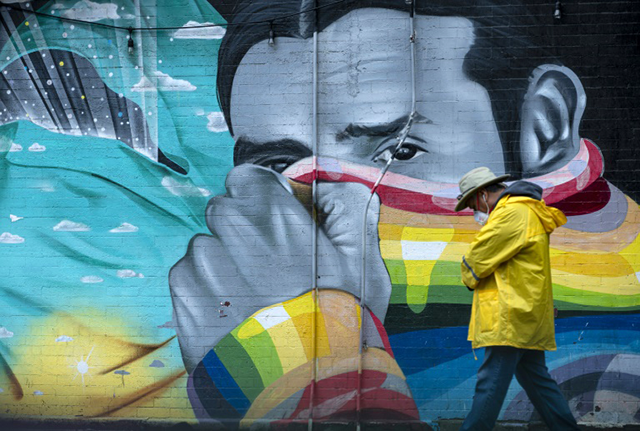- International News
- Web-2020-04-15 | 04:17 pm

Austria followed Spain in slowly reopening some sectors, while US President Donald Trump said in his country -- the worst hit by far — numbers were "plateauing".
Italy also allowed some business to resume, though a nationwide lockdown remained in place, keeping many in their homes.
As countries reach different stages of the coronavirus curve, debate is raging over whether to return to normal life and possibly risk a second wave of infections.
Not all countries are ready to reopen. France extended its nationwide lockdown for another month, while India said lockdown measures for its 1.3 billion people would stay in place until May 3.
Since emerging late last year in China, the coronavirus pandemic has killed more than 120,000 and infected nearly two million, tipping the world towards a fierce economic recession as more than half of the globe hunkers down at home.
Governments are under pressure to keep their people safe while saving their economies from total collapse amid soaring unemployment rates and dire warnings of a hammering not seen since the Great Depression.
France on Tuesday said its economy is expected to shrink by 8 per cent, worse than previous projections, while in Britain the Office for Budget Responsibility fiscal watchdog said that GDP could fall by 13 per cent.
'Afraid of the virus'
Sweeping lockdown orders have kept more than four billion people hemmed into their homes across the world as governments scramble to contain the deadly pandemic.
But some countries showed signs of setting off the long road back to normalcy.
Vienna's popular Favoriten district drew mask-clad shoppers after the government allowed some small shops as well as hardware and gardening stores to reopen across the country.
But social distancing rules remained in place: queues were staggered and one tobacco shop only served customers on the street.
"[I'm]afraid of the virus", said Fatih Altun, who runs a laptop repair shop.
But he was relieved to be able to get back to work after losing some 6,000 euros ($6,600) since closing his business last month.
"I had to fire my only employee," he said.
Austria has been spared the worst of the virus with some 14,000 cases and over 300 deaths.
Badly-affected Spain on Monday allowed construction and factory employees to go back to work, and police handed out face masks in Madrid metro stations.
The country's daily death toll saw a slight rise Tuesday, though new infections dropped to the lowest level since Spain imposed a nationwide lockdown last month.
In Italy, where the death toll is now above 20,000 -- second worst after the US -- but deaths and infections have eased off, some bookshops and launderettes were allowed to open again.
But many remained shuttered as stay-at-home measures were kept in place for most of the country's 60 million citizens.
And Denmark planned to open some of its schools on Wednesday after a month-long shutdown.
But World Health Organisation chief Tedros Adhanom Ghebreyesus warned control measures "must be lifted slowly," noting that the coronavirus was 10 times deadlier than the 2009-10 swine flu outbreak.
"Control measures can only be lifted if the right public health measures are in place, including significant capacity for contact tracing," he said.
'Worst is over'
In Washington, Trump said US numbers could be steadying as 1,509 new daily deaths were reported -- almost identical to the previous day.
In New York, where the virus has killed more than 10,000 people -- almost half of the US total -- and seen unclaimed victims buried in unmarked mass graves, Governor Andrew Cuomo said the nightmare might be coming to an end.
"The worst is over if we continue to be smart going forward. I believe we can now start on the path to normalcy," Cuomo told reporters.
"It's not going to be, we flip the switch, and everybody comes out of their house, gets in their car, waves and hugs each other, and the economy will start."
The economic impact in the US and elsewhere could be seen as officials in the southern city of Houston wrapped food in plastic bags and threw them into cars.
"We went to the stores and they are closed. Yes, we had problems to buy food," said sales assistant Catalina Mendoza Cabrera.
'Endure a little longer'
In France, one of Europe's worst-hit countries, President Emmanuel Macron said in a televised address Monday night the epidemic there was "beginning to steady... [and] hope is returning".
However, he said a strict lockdown in force since March 17 would continue until May 11 -- after which schools and businesses could gradually reopen at a "progressive" rate.
Nigerian President Muhammadu Buhari told his citizens they must "endure a little longer" as he also extended a lockdown in key cities saying: "We must not lose the gains achieved thus far."
And in Britain, where Prime Minister Boris Johnson is recovering after a week in hospital with the virus, officials warned the peak was still to come and the lockdown there was likely to endure.
But there were cautionary tales that the virus is not easily defeated.
In China, where the outbreak first reared its head and the government says it has largely curbed the spread of the virus, officials announced scores of new imported infections.













